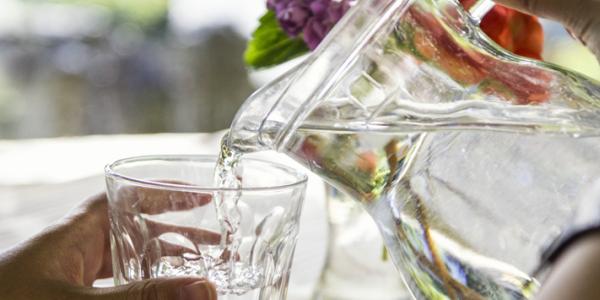
Summer sunshine and hot temperatures prompt us to drink more fluids. After all, our bodies need about 2 liters (64 ounces or 8 cups) of fluid daily to function well.
Your age, state of health and physical environment will determine your actual need. But considering the body is about 60% water, it is a very important nutrient.
We usually think a nutrient provides calories (energy), protein, vitamins and minerals. Water does not provide any of these and yet we know that if you do not get enough fluid you may have problems such as low blood pressure, constipation, kidney issues and even a change in mental state (irritability and confusion).
There are times when your body needs more than the recommended 8 glasses of fluid daily.
- If you are being treated with chemotherapy, your body needs more fluids to help the kidneys "flush out well"
- If you are losing more fluids because of diarrhea or vomiting, you need to replace those lost fluids
- With increased physical activity, especially in warmer temperatures, intentionally drinking more fluids is important
You may identify with this analogy: Think of a balloon that has lost some of its air. A partially inflated balloon does not "function" as it should. It can't float in the air very well and looks "shriveled". If you do not drink adequate fluids, you feel like a "deflated balloon". You will have a gradual decrease in performance, both physical and mental, as the degree of dehydration increases.
Skip
Hydrate
Water, in most cases, is the best choice for meeting your daily fluid needs. It has zero calories, is not expensive and is readily available. It can be flavor enhanced with a wedge of citrus (lime, lemon, orange) or with greens (mint, cucumber slices). Carry a water bottle with you everywhere you go.
Rehydrate
If you need to replace losses of fluid from diarrhea, vomiting, or high ostomy output, then it is important to rehydrate. Endurance athletes, distance hikers and world travelers who are at risk for travelers' diarrhea also need to rehydrate. A special rehydration fluid is valuable as these rehydration fluids are designed to be absorbed better than plain water.
Large companies market sports drinks as rehydration beverages but these are actually too concentrated and will pull water into your stomach or intestines and reduce the speed of fluid replacement. In the case of replacing fluids due to diarrhea or high ostomy output, the concentrated sports drinks can make the diarrhea worse.
The best rehydration fluids have a specific ratio of glucose and sodium. With this specific recipe of glucose and sodium, your body uses a special carrier at the cell level to move water from inside your intestines to your tissues to rehydrate you more efficiently. These rehydration fluids are called Oral Rehydration Solutions. Oral rehydration solutions can be purchased in a ready-to-drink or in a powdered form to mix into water. The powdered form is convenient to take with you or keep on hand. One example is Pedialyte®.
You can also make your own oral rehydration solutions from common beverages. Each recipe makes one liter. Aim to drink 1 cup four times daily to rehydrate from loss of fluids. This is for those who have diarrhea or if you are an endurance athlete or distance hiker.
Oral Rehydration Recipes
| Regular Gatorade | 1 1/2 cups Gatorade 2 1/2 cups water 3/4 teaspoon salt |
| Gatorade G2 | 4 cups Gatorade G2 1/2 teaspoon salt |
| Grape or Cranberry Juice | 3/4 cup juice 3 1/4 cups water 3/4 teaspoon salt |
| Apple Juice | 3/4 cup juice 3 1/4 cups water 3/4 teaspoon salt |
| Tomato Juice | 2 1/2 cups tomato juice 1 1/2 cups water |
Cancer Healthy™ Beverages
Choose beverages that do not have added sugars. Research links sugary beverages to weight gain and obesity. Obesity is a risk factor for thirteen cancers. One 12-ounce soda has 6 1/2 teaspoons sugar. A pre-sweetened iced tea has 4 or more teaspoons sugar.
Pure fruit juices do not have added sugar and since they are a plant, they have phytonutrients which fight cancer. Just remember it takes 4-5 oranges to make an 8-ounce glass of juice. Juices are high in calories (good if you need to gain weight, but not recommended if you are trying to prevent weight gain or are a diabetic). An option is a diluted fruit juice, so you can enjoy the fruit flavor and consume fewer calories.
Green tea and coffee have phytonutrients and are enjoyed by many. While caffeinated drinks may have a mild diuretic effect - meaning they may cause the need to urinate - they do not increase the risk of dehydration when consumed in moderate amounts.
Summary
Staying hydrated is important for everyone. You may not be able to rely on your thirst to prompt you to drink fluids. Develop good habits of drinking healthy and adequate fluids that meet your specific needs. If you have more questions about what is best for you, talk to your health care provider or a registered dietitian nutritionist (RDN).
Written by Charis W. Spielman, MPH, RDN, CSO, CNSC
Certified Specialist in Oncology Nutrition
Certified Nutrition Support Clinician

